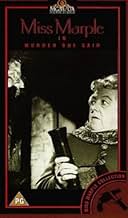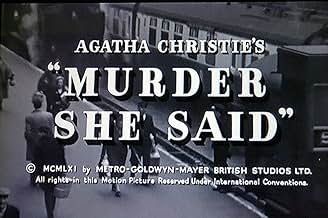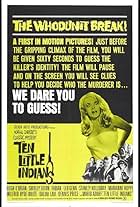When Miss Jane Marple reports witnessing a murder through the window of a passing train, the police dismiss her as a dotty spinster when no trace of the crime can be found.When Miss Jane Marple reports witnessing a murder through the window of a passing train, the police dismiss her as a dotty spinster when no trace of the crime can be found.When Miss Jane Marple reports witnessing a murder through the window of a passing train, the police dismiss her as a dotty spinster when no trace of the crime can be found.
- Inspector Craddock
- (as Charles Tingwell)
Featured reviews
What this thriller develops is not so much the style but, above all, the absolutely stunning, sympathetic, witty, intelligent, vibrant character of Miss Marple. Based upon the novel by Agatha Christie "4.50 From Paddington" she is the character with certain knowledge of criminal mind. Now, she is placed in the situation which puts her to harsh test and imposes constant alertness. Quoting the New York Times review which appeared just after the American premiere of the movie, Miss Marple proves that "the aging but still vigorous female of the species can be a better sleuth than the Scotland Yard operatives." Name of Marple, nature of marble (referring to the screenplay)...that is what highlights best her character. That is also what makes it interesting also for modern audiences. And MURDER SHE SAID beautifully introduces her to viewers. However, the true entertainment does not lie in the literary source (Agatha Christie was not happy about the numerous liberties taken) but by the actress who interprets Miss Marple, adorable Dame Margaret Rutherford.
Although MURDER SHE SAID is just the first of four movies made within the adaptations, she appears as a truly creative and gifted performer from the very start. It is Miss Rutherford who dominates our attention and makes the thriller a rarity of its genre as a novel adaptation and as a cinematic production. When I saw her performance first with my friend, I was stunned throughout. In majority, thanks to her, thrill is combined with humor and cutting tongue with the most honest intentions. She executes her lines marvelously! Determined but calm and patient, witty but, as wisely advised, never 'too comfortable' - that is how she remains with viewers and allows us to grasp the idea of skillfully proceeding acting. As her male counterpart, in a way, comes Stringer Davis, her husband in real life, in the role of Mr Stringer. From the moment when the police inspector Craddock (Charles Tingwell) occurs to care little about the crime, they begin their own investigation. In their scenes, the two carry the essence of humor in the film. Just to note the unforgettable scene when, early in the morning after 'hearty breakfast,' Mr Stringer is giving Miss Marple 'a leg up' and they find both the dog and the man really 'frightful-looking.' Alone, she is absolutely captivating when encountering the Ackenthorpes, a really peculiar dynasty with just little exceptions (Emma). It seems that the only good thing the family have ever done were...delicious biscuits. It soon occurs that both things and crimes go in threes. All sorts of people from neurotic eccentrics to calm doctors gently tease our senses...
They are all worth broader consideration as supporting characters, those temporary 'tresspassers' who highlight the backdrop for the mystery because the performances are exceptionally well crafted. James Robertson Justice, an eminent British actor, beautifully portrays an old, pretentious, mean, neurotic 'Chairman' of the family who cannot stand the drawbacks of his own within other people, including impertinence. He strongly and strictly prefers beef steak to beef broth. Everything and everybody seem to move around his affairs and his premonitions of what he thinks other people mean. Some of the most spicy moments appear between him and Miss Marple with memorably cutting remarks in their lines. Apart from Charles Tingwell as skeptical inspector Craddock (who appears in all four films), the cast who need particular attention are Arthur Kennedy as family's ambiguous doctor and Ronnie Raymond as 'too clever' yet sympathetic youngster Alexander, who sees the family as 'vultures' with some exceptions and who appears and disappears in the most unpredictable moments. Consider his scenes with Miss Marple...They seem to share some interests...in golf for instance.
The atmosphere of the movie makes MURDER SHE SAID a pure classic thriller, old thriller with the magic of black and white and the slight features of horror in some of the scenes. It is considerably supported by lighting, sets and undertones of images. The magical effect is provided by Ron Goodwin's music score where a variety of tunes beautifully create a balance between tension and relief.
MURDER SHE SAID and, finally, 'riddle she figures out' and 'murderer she finds' yet...before you decide to see this movie, which I highly recommend, prepare for great tensions and a number of misleading predictions. Worn in lots of mysteries, lots of suspicions - yes. But isn't that what should emerge from a perfect detective story? Never ignore 'dotty old maid' and never skip a 'dotty old thriller' that may truly surprise us all. Indeed, a sleuth's work is never done and Miss Rutherford makes us look forward to more ...
What generally makes this movie so delightful is the humorous style which I strongly connected to the classic Ealing comedies. There is also some obvious influence of Hitchcock's early films from his English period, for example the trick of using a woman's scream and a train whistle together very effectively. Good looking sharp photography and fast-paced direction keep things moving . The dialog is very stylish, so "utterly British" for someone from a different language area and a treat for one's ear. I doubt if anyone really talks like that anymore, but hopefully I'm utterly wrong.
And for once I guessed the murderer right beforehand without spoiling any of my fun. On the contrary, the movie gave me such a good time it fully surprised me in that. Judging by this and the trailers of the other films in the series (Yes, hurray, there is more of it!) I'll have to catch up with the rest of them too. Do let your evening be crowned or saved by this wonderful film.
Murder She Said marked the first big-screen appearance of Agatha Christie's Miss Marple. The script by David Pursall and Jack Seddon is based on the 1957 novel "4:50 From Paddington". Its success lead to three more equally entertaining films starring Margaret Rutherford. Agatha Christie liked Rutherford as an actress but thought that she was all wrong for the part. Indeed Rutherford is nothing like the Jane Marple that Joan Hickson would portray in the highly successful BBC series of the 1980's-90's, but she is a delight to watch as she makes the part entirely her own and earned herself a legion of fans. Incidentally, Hickson appears in this film in a minor role as the miserable housekeeper Mrs Kidder. A great supporting cast includes Muriel Pavlow, Arthur Kennedy and James Robertson Justice. Charles Tingwell plays the hapless Inspector Craddock who cannot bear Miss Marple interfering and solving his cases for him, a role which in which he is featured in all the entries in this series. Another regular in the series is Stringer Davis (Rutherford's real life husband) who plays the local librarian and her closest friend Mr Stringer.
Director George Pollock worked steadily as an assistant director during the forties and fifties and during that time he learned at the feet of some of Britain's most acclaimed directors such as Thorold Dickinson on Gaslight (1940) and David Lean on Brief Encounter, Great Expectations (both 1945) and Oliver Twist (1948). After directing a few trivial comedies such as Village Of Daughters (1961), Pollock had an opportunity with the Marple films to show that he was a very good director investing the films with great British humour as well as intriguing mystery making them timeless entertainment. The films resembled the quota quickies of the 1950's, but they were done with a slightly higher budget, more professionalism and better production values. In addition, Ron Goodwin's music is splendid and the harpsichord laden theme tune would become familiar as it was used in all the other entries in this series. I don't think I would be going over the top to use a well-worn phrase "they don't make them like that anymore". "4:50 From Paddington" has been filmed twice subsequently. In 1987 the BBC gave us a faithful but rather stodgy version starring Joan Hickson and ITV filmed it in 2004 as part of their new series of Miss Marple whodunits starring Geraldine McEwan. But the less said about these the better.
Sequels: MURDER AT THE GALLOP (1963), MURDER MOST FOUL (1964) and MURDER AHOY (produced in 1964 but released in late 1965 to space out the series).
This is the first in it and it evokes the era extraordinarily well, the quick murder and disposal of the body, the old country house, the many suspicious relatives and one of my favourites, James Robertson Justice heading up the entire clan. He even gets to propose to the lady herself, so impressed is he with her detecting.
Add the requisite cute kid, Ronnie Raymond, an excellent bit part by Joan Hickson (the future Miss Marple in the excellent BBC series) and what faults are there to be found in this unique first film of four in the series.
8 out of 10.
Incredibly entertaining, wonderful use of black and white film medium and a really good score.
The story sticks relatively close to the events in the novel 4:50 from Paddington, with one major exception that may surprise fans of this series who have not read the novels. Christie's Marple was really a sedate, seemingly dithery woman who basically spends most of the books sitting on her backside knitting - in fact, in some of the novels Marple actually gets very little time and is merely on-hand to piece together the clues provided by others and provide the name of the culprit. In this case, screenwriters wisely combined a young character with Miss Marple so she remains front and center in the action. I much prefer these films as opposed to the more traditional renderings from BBC/PBS as Miss Marple is depicted here as such a vital and uniquely active free spirit. Rutherford is simply wonderful with her unforgettable expressions. She plays well off a diversity of people, including the gloriously crusty hypochondriac patriarch James Robertson Justice, the mischievous grandson Ronnie Raymond, the mildly exasperated police inspector Charles Tingwell or the gentle compatriot Stringer Davis.
A delightful series and a testament to a great talent who should never be forgotten.
Storyline
Did you know
- TriviaThe name of the manor house where Miss Jane Marple conducts her inquiries is called Rutherford Hall in Dame Agatha Christie's 1957 novel. It was changed to Ackenthorpe in this movie to avoid comparison with the surname of Dame Margaret Rutherford (Miss Jane Marple).
- GoofsWhen Jim Stringer gives Miss Marple a leg up to look over the wall, she spots the gardener on the other side. At the same time, Stringer's head appears in the shot although he is supporting Miss Marple. Also the wall is far higher than he is.
- Quotes
Ackenthorpe: Cod's as good as lobster any day, and much cheaper.
Miss Marple: Well, that depends on whether or not one has a palate unsullied by cheap opiates.
Ackenthorpe: If you mean what I think you mean, I'll have you know this cheroot cost two shillings!
Miss Marple: Yes. Quite.
- ConnectionsFeatured in Timeshift: Between the Lines: Railways in Fiction and Film (2008)
- SoundtracksFrère Jacques
(uncredited)
Details
- Release date
- Country of origin
- Language
- Also known as
- Agatha Christie's 'Murder, She Said'
- Filming locations
- Amerden Lane, Taplow, Maidenhead, Buckinghamshire, England, UK(Ackenthorpe Hall entrance gates and and road bridge under railway)
- Production companies
- See more company credits at IMDbPro
- Runtime1 hour 27 minutes
- Color
- Aspect ratio
- 1.66 : 1
Contribute to this page





































